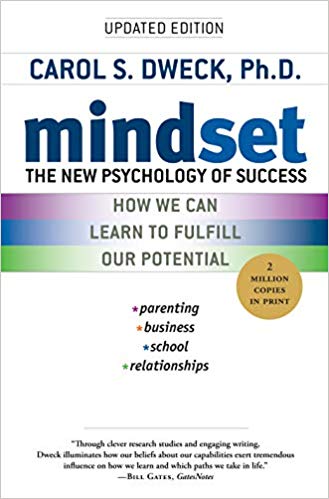

This article is an excerpt from the Shortform summary of "Mindset" by Carol Dweck. Shortform has the world's best summaries of books you should be reading.
Like this article? Sign up for a free trial here .
Parents want to help their kids to succeed in school and life, yet their comments, actions and attempts to be helpful often send the wrong message. What’s the secret to developing a growth mindset for parents?
We’ll cover what a growth mindset for parents is, how to have one, and how to convey it to your kids so they have growth mindsets, too.
Developing a Growth Mindset in Kids
As we’ll see, your child’s growth mindset comes from yours. This is why a growth mindset for parents is so important. Words and actions from adults tell young children, students, and athletes what to think about themselves. They can convey a fixed-mindset message that children’s traits are permanent and they’ll be judged for them. Or they can convey a growth-oriented message that children (and all people) are continually developing and adults are committed to helping them in this process.
Children are extremely sensitive to these messages. They’re concerned about how they’re being tested/judged and what will happen if they fall short. A growth mindset for parents is crucial.
Kids Hear Messages Constantly
Children with fixed mindsets hear judgment from their parents — it feels as though their abilities are always being measured.
To understand children’s thinking, researchers asked them several questions. Here are the responses from both the fixed-minded and growth-oriented kids.
Question #1: Imagine that your parents are happy when you get a good grade. Why would they be happy?
- Fixed-minded children responded along the lines of: “They were happy to see I was smart.”
- Growth-minded children said a good grade meant they’d buckled down and worked hard.
Question #2: Imagine that your parents talked with you about your performance when you did poorly. Why would they do this?
- Fixed-minded children responded that their parents probably were worried that they weren’t smart, that bad grades might mean they weren’t smart.
- Growth-minded children said their parents likely wanted to teach them better study methods for the future.
Question #3: Imagine your parents were upset when you didn’t share. Why would they feel this way?
- Fixed-minded children responded that their parents thought the behavior showed they were a bad person.
- Growth-minded children said their parents probably wanted to help them learn and get along better with other kids.
Normal kids often misbehave (actually, every three minutes) — it can be an opportunity either to judge them as having failed or to help them grow. This is one reason why a growth mindset for parents is essential.
Children pick up these lessons from an early age, even as toddlers. They learn either that mistakes merit judgment and punishment or they can bring suggestions and help for how to do better. Teaching rather than judging is what helps children learn.
Kids Pass On Messages
Children are eager to pass on things they’ve learned. This includes messages from either mindset.
For example, researchers asked children what advice they’d give to a child who was having trouble with math. Children with a growth mindset said they would advise the child to read the problem again, think harder, or maybe ask the teacher for help. Children with fixed mindsets had no help to offer since they viewed ability as a fixed trait. For instance, one child just said, “I’m sorry.” These reactions are learned, making a growth mindset for parents important.
Messages about Success: When Praise Hurts
When children do something well, most parents want to encourage them or build their confidence, but often they’re not helping the way they think they are. A growth mindset for parents changes a parent’s response. Here’s how many parents respond — and what their kids hear:
- “Wow, you learned that fast; you’re really smart.” What the child hears: If you don’t learn fast, it means you’re dumb.
- “Look how smart you are — you got an A without even studying.” What the child hears: If I have to study, it means I’m not smart.
- “Look at that artwork — You’re the next Picasso.” What the child hears: If I draw something difficult and fail, they’ll see I’m not really a talented artist. I’d better not take the chance.
These examples show that praising children’s intelligence hurts their motivation and performance. Children getting fixed-mindset praise develop resistance to difficult challenges that might show they’re not so smart or talented. If they try and fail, they further lose motivation and confidence. They believe the message that their performance — success or failure — reflects who they are: If success means they’re smart, failure means they’re dumb.
The best way for parents to help their children build confidence is to teach them to welcome challenges, to want to understand mistakes, to enjoy effort, and to continually look for and try new learning strategies. These are the basic elements of a growth mindset for parents.
How to Praise Children
The research findings on the de-motivating effects of praise don’t mean praising children is bad and we shouldn’t do it. Children love praise and need adult approval. The key is to avoid praise that judges their intelligence or ability, which implies you’re proud of them for an inherent trait rather than for their effort and improvement.
Applying a growth mindset for parents, praise them for what they’ve achieved through good study strategies, practice, and persistence. Show interest in how they succeeded or improved, in their efforts and choices. For instance, you might comment, “You really studied hard and it paid off. I can see how much you improved. Outlining the important points was a good strategy.” Or, “It’s great that you kept trying different ways of solving that math problem until you got it.”
For a student who worked hard and didn’t do so well, a helpful response would be: “Everyone learns differently. Let’s try to find a way that works for you.” (This approach is especially helpful for children with learning disabilities.) Or, “I like your effort. Let’s work on it some more and figure out where you’re having trouble.” This is another example of a growth mindset for parents.
For a student who did something quickly without mistakes, avoid praising speed and perfection, which will get in the way of tackling challenges. It would be more constructive to say something like, “You finished that assignment so quickly that it must have been too easy. Let’s try something else that you can really learn from.”
Sometimes parents use growth-oriented language with their children, but then undercut it by expressing judgments (fixed-mindset statements) about other people, which the kids overhear. For instance, they might remark, “Some have it and some don’t” or “What a lame-brain.” When children hear things like this, they wonder whether those judgments apply to them too. Remember, they’re always listening. It’s important to have a growth mindset for parents all the time.
Reassuring Children
When children are preparing to take a challenging test, it’s natural for parents to want to reassure them by saying something like, “You can do this — you know you’re smart.” This usually has the opposite effect of raising the stakes and making them even more afraid of failing. This isn’t the language of the growth mindset for parents. Instead, sympathize with the pressure they feel for potentially being judged. Reassure that you’re not judging them —you care about their learning, and are proud that they’ve worked hard and continued to improve.
Messages About Failure
Society tells parents that the way to boost children’s self-esteem is to protect them from failure — for instance, by minimizing a loss or blaming the coach or teacher. This might make children feel better temporarily, but it’s harmful in the long run because they don’t learn to handle life’s inevitable setbacks. They react poorly to feedback, saying it undermines their confidence, and want only to hear about how talented they are.
Growth-minded parents take an interest in their child’s failure, seeing it as an opportunity to learn. They don’t get upset or concerned about the child’s ability, or whitewash the failure. This is an important piece of the growth mindset for parents.
Imagine how you might respond when your nine-year-old daughter, a budding gymnast, performs reasonably well at her first gymnastics meet but doesn’t win a ribbon. She’s crushed because she was confident she’d win. Here are typical, but fixed-mindset, ways to console her:
- Tell her you thought she was the best (this is a lie and she knows it).
- Tell her the judges were unfair and she should’ve gotten a ribbon (this blames others).
- Tell her gymnastics isn’t that important (sends the message that if you’re not great at something new immediately, it’s not worth pursuing).
- Tell her she has the talent and will win next time (talent will get you where you want to go).
- Tell her she didn’t deserve to win because she didn’t practice enough (this could be growth-minded and helpful, if it were said in a different way).
Here’s how a growth-minded father actually responded in the above scenario. He told her he understands how disappointing it is when you have high hopes and do your best but don’t win. However, he also pointed out that she hadn’t really earned a win yet, since she was just starting in gymnastics and had a lot to learn. Other girls on the team had worked harder and longer. She’d have to do the same if she really wanted to excel. He told her that doing a sport just for fun is fine too, but excelling requires a higher level of commitment. With this feedback, the girl worked harder, especially on weaknesses, and won five ribbons and was overall champion at a bigger competition.
How to Give Constructive Feedback
Everyone thinks the criticism they give their children is constructive. But while they intend it to be helpful, often it isn’t. To be constructive, criticism must help a child fix something or do something better. Most often, what they hear from parents isn’t constructive — it’s judgmental. Judgment isn’t a part of the growth mindset for parents.
For example, when a child does incomplete or sloppy work, a frustrated parent might say, “You mean this is all you can do? Are you stupid or lazy?”
Instead, constructive or growth-oriented criticism would sound like, “It upsets me when you don’t finish an assignment. When can you finish this?” Or, “This looks like an assignment that requires a lot of concentration and effort. Let’s talk about how you apply concentration skills.”
Discipline
When parents judge and punish children, they’re usually trying to teach them something — but children may learn an unintended lesson. For instance, when parents punish a child for doing something wrong (making a bad decision), they’re teaching the child not to go against the parents’ rules and wishes. Instead, what they should be teaching is how to think through a situation and make a better decision next time. Growth-oriented parents set high standards and teach children how to meet them rather than judging and punishing them for falling short. This is key in a growth mindset for parents.
Extreme Expectations
It’s natural for parents to have high aspirations for their children, but sometimes parents allow their desires to take precedence over what’s best for the child or what the child wants.
For example, Mark was exceptional in math and wanted to go to Stuyvesant High School for its advanced math curriculum. But his parents made him go to a different school because they’d heard that it would be hard for him to get into Harvard from Stuyvesant. They didn’t care about his interests, only about theirs. They wanted him to succeed, but on their terms. Their message was, “We’ll love you only if you go to Harvard.”
Many children pick up this type of message. Researchers studied children age six to college-age and found that those with fixed mindsets believed they had to fulfill their parents’ expectations in order to be loved and respected.
John McEnroe’s father put tremendous pressure on him to excel at tennis when he discovered the boy was good at it. As a result of the pressure, McEnroe didn’t enjoy playing tennis. He liked being at the top for the money and fame, but he never liked the sport.
In contrast, Tiger Woods’ father, although ambitious, fostered his son’s love of golf and raised him to focus on growth and learning. He once said he’d have been happy if his son had chosen another occupation, such as being a plumber, as long as he applied himself.
When parents force fixed-mindset ideals and aspirations on their children, they eliminate any room for failures or for their child’s individuality. However, when they adopt a growth mindset for parents and encourage their children’s development of interests or passions, neither will be disappointed.
———End of Preview———

Like what you just read? Read the rest of the world's best summary of "Mindset" at Shortform . Learn the book's critical concepts in 20 minutes or less .
Here's what you'll find in our full Mindset summary :
- The difference between a growth and a fixed mindset
- How a fixed mindset keeps you back throughout your life: education, relationships, and career
- The 7 key ways to build a growth mindset for yourself





